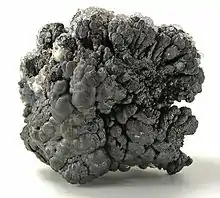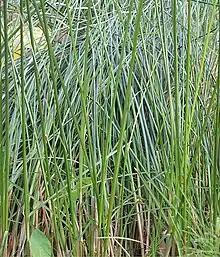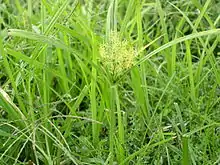ore
English
Etymology
From Middle English or, oor, blend of Old English ōra (“ore, unwrought metal”) and ār (“brass, copper, bronze”), the first a derivate of ear (“earth”), the second from Proto-Germanic *aiz (cognates Old Norse eir (“brass, copper”), German ehern (“of metal, of iron”), Gothic 𐌰𐌹𐌶 (aiz, “ore”)), from Proto-Indo-European *áyos, h₂éyos. Compare Dutch oer (“ferrous hardpan; bog iron ore”). Compare Latin aes (“bronze, copper”), Avestan 𐬀𐬌𐬌𐬀𐬵 (aiiah), Sanskrit अयस् (áyas, “copper, iron”).
Pronunciation
- (General American) enPR: ôr, IPA(key): /ɔɹ/
- (Received Pronunciation) IPA(key): /ɔː/
- (rhotic, without the horse–hoarse merger) enPR: ōr, IPA(key): /o(ː)ɹ/
- (non-rhotic, without the horse–hoarse merger) IPA(key): /oə/
Audio (US) (file) - Rhymes: -ɔː(ɹ)
- Homophones: oar, o'er; or (in accents with the horse-hoarse merger); aw, awe (in non-rhotic accents with the horse–hoarse merger)
Noun
ore (countable and uncountable, plural ores)

- Rock or other material that contains valuable or utilitarian materials; primarily a rock containing metals or gems for which it is typically mined and processed.
- 2014 April 21, “Subtle effects”, in The Economist, volume 411, number 8884:
- Manganism has been known about since the 19th century, when miners exposed to ores containing manganese, a silvery metal, began to totter, slur their speech and behave like someone inebriated.
-
Derived terms
- iron ore
- orefield
Translations
|
See also
 ore on Wikipedia.Wikipedia
ore on Wikipedia.Wikipedia
Anagrams
- EOR, REO, ROE, Roe, o'er, roe
Afrikaans
Pronunciation
- IPA(key): [uə̯ɾə]
Noun
ore
- plural of oor
Aromanian
Alternative forms
- oarã
Etymology
From Latin hōra. Compare Romanian oară.
Noun
ore f (plural or, definite articulation ora)
- a time, instance
Basque
Noun
ore inan
- dough
Borôro
Noun
ore
- child
Galician
Verb
ore
- first-person singular present subjunctive of orar
- third-person singular present subjunctive of orar
Guaraní
Pronunciation
- IPA(key): /oˈɾe/
Pronoun
ore
- we (exclusive)
- Ore roha'ã. ― We (excluding the listener, we and not you) try.
- Ñande jaháta okápe ha ore ropytáta ko yvyra pýpe. ― We (all, everyone) will go outside and we (not everyone, just me and some other people) will stay by this tree.
Determiner
ore
- our (possessive determiner of ore)
- Kóva ore mbo'ehao. ― This is our (and not your) school.
See also
| singular | plural | |
|---|---|---|
| 1st person | che | ore (exclusive) ñande (inclusive) |
| 2nd person | nde | peẽ |
| 3rd person | ha'e | ha'ekuéra, hikuái |
Italian
Pronunciation
- IPA(key): /ˈo.re/
- Rhymes: -ore
- Hyphenation: ó‧re
Noun
ore f
- plural of ora
Anagrams
- -erò, Ero, ero, reo, reo-
Japanese
Romanization
ore
- Rōmaji transcription of おれ
Latin
Noun
ōre n
- ablative singular of ōs
References
- “ore”, in Harry Thurston Peck, editor (1898) Harper's Dictionary of Classical Antiquities, New York: Harper & Brothers
Mbyá Guaraní
Etymology
Cognate with Guaraní ore.
Pronoun
ore
- we (exclusive)
Middle Dutch
Etymology
From Old Dutch ōra, from Proto-Germanic *ausô.
Noun
ôre n
- ear
Descendants
- Dutch: oor
- Afrikaans: oor
- Jersey Dutch: ôr
- Negerhollands: oor, hoor, ho
- Limburgish: oear
Further reading
- “ore”, in Vroegmiddelnederlands Woordenboek, 2000
- Verwijs, E.; Verdam, J. (1885–1929), “ore (I)”, in Middelnederlandsch Woordenboek, The Hague: Martinus Nijhoff, →ISBN, page I
Middle English
Etymology 1
From the oblique forms of Old English ār (“oar”), from Proto-West Germanic *airu, from Proto-Germanic *airō.
Alternative forms
- hore, oore
- are, aurre (Northern)
Pronunciation
- IPA(key): /ˈɔːr(ə)/
- (Northern) IPA(key): /aːr/
Noun
ore (plural ores)
- oar (lever for propelling a boat)
Descendants
- English: oar
- Scots: air
References
- “ōr(e, n.(1).”, in MED Online, Ann Arbor, Mich.: University of Michigan, 2007.
Etymology 2
From the oblique forms of Old English ār (“honour”), from Proto-West Germanic *aiʀu, from Proto-Germanic *aizō.
Alternative forms
- oore, or, ȝore
- aore, are, ære (early)
- ar, are (Northern)
Pronunciation
- IPA(key): /ˈɔːr(ə)/
- (early) IPA(key): /ˈɑːr(ə)/
- (Northern) IPA(key): /aːr/
Noun
ore (uncountable)
- honour, respect (recognition of value)
- grace, favour (positivity towards someone)::
- permission, approval (to engage in a behaviour)
- mercy, clemency (remission of punishment)
- respite, security (safety from harm)
Related terms
- oreles
- oren
References
- “ōr(e, n.(2).”, in MED Online, Ann Arbor, Mich.: University of Michigan, 2007.
Etymology 3
Originally two distinct nouns:
- Old English ōra, of unknown origin, perhaps connected to ēar (“earth”).
- Old English ār (“brass”), from Proto-West Germanic *aiʀ, from Proto-Germanic *aiz, from Proto-Indo-European *h₂éyos.
Alternative forms
- hure, oer, or, oor, oore, oure, ure
Pronunciation
- IPA(key): /ˈoːr(ə)/, /ˈɔːr(ə)/
Noun
ore (plural ores)
- ore (rock that contains metal)
Descendants
- English: ore
- Scots: ure, uir
References
- “ọ̄r(e, n.(3).”, in MED Online, Ann Arbor, Mich.: University of Michigan, 2007.
Noun
ore
- Alternative form of oure (“aurochs”)
Determiner
ore
- Alternative form of oure (“our”)
Determiner
ore
- Alternative form of your
Determiner
ore
- (chiefly Early Middle English and West Midlands) Alternative form of here (“their”)
Noun
ore
- Alternative form of hore (“muck”)
Middle French
Etymology
Old French ore.
Adverb
ore
- now
- 15th century, Rustichello da Pisa (original author), Mazarine Master (scribe), The Travels of Marco Polo, page 4, line 2:
- des choses lesquelles nous ne conterons pas ore
- of things we will not speak of now
-
Descendants
- French: or
Middle High German
Etymology
From Old High German ōra, from Proto-Germanic *ausô.
Noun
ore n
- ear
Descendants
- Alemannic German: Oor
- Bavarian: Oar
- Central Franconian: Uhr, Ohr
- Hunsrik: Oher
- Luxembourgish: Ouer
- German: Ohr
- Rhine Franconian:
- Pennsylvania German: Ohr
- Vilamovian: ür
- Yiddish: אויער (oyer)
Middle Low German
Etymology
From Old Saxon ōra, from Proto-Germanic *ausô.
Pronunciation
- Stem vowel: ô²
- (originally) IPA(key): /ɔːrə/
Noun
ôre n
- ear
Descendants
- Low German: Ohr
- Dutch Low Saxon: oor
- German Low German: Or, Ur
- Plautdietsch: Oa, Ua
Old English
Etymology
(This etymology is missing or incomplete. Please add to it, or discuss it at the Etymology scriptorium.)
Pronunciation
- IPA(key): /ˈo.re/
Noun
ore f
- A mine, place in which ore is dug
Declension
| Case | Singular | Plural |
|---|---|---|
| nominative | ora | oran |
| accusative | oran | oran |
| genitive | oran | orena |
| dative | oran | orum |
Derived terms
- īsernōre (“iron mine”)
Related terms
- ōra (“ore”)
- gyldenweċġ (“gold mine”)
Old French
Etymology 1
For earlier *aore, from Latin hāc hōrā (“(in) this hour”).
Alternative forms
- or, ores
Adverb
ore
- now
Descendants
- French: or (archaic)
Etymology 2
From Latin hōra, from Ancient Greek ὥρα (hṓra).
Alternative forms
- hore, eure, heure, eur, heur
Noun
ore f (oblique plural ores, nominative singular ore, nominative plural ores)
- hour; time, period of the day (period of time)
- circa 1170, Chrétien de Troyes, Érec et Énide:
- quel haste avez,
Qui a tel ore vos levez?- What haste do you have
- That wakes up at this time of day?
- quel haste avez,
- circa 1170, Chrétien de Troyes, Érec et Énide:
Descendants
- English: hour
- French: heure
- Norman: heure, houre (continental Norman), heuthe (Jersey), haeure (Guernsey)
Pali
Alternative forms
- 𑀑𑀭𑁂 (Brahmi script)
- ओरे (Devanagari script)
- ওরে (Bengali script)
- ඔරෙ (Sinhalese script)
- ဩရေ or ဢေႃရေ (Burmese script)
- โอเร (Thai script)
- ᩋᩰᩁᩮ (Tai Tham script)
- ໂອເຣ (Lao script)
- ឲរេ (Khmer script)
- 𑄃𑄮𑄢𑄬 (Chakma script)
Adjective
ore
- locative singular masculine/neuter & vocative singular feminine & accusative plural masculine of ora (“lower”)
Portuguese
Verb
ore
- inflection of orar:
- first/third-person singular present subjunctive
- third-person singular imperative
Romanian
Noun
ore
- inflection of oră:
- plural
- genitive/dative singular
Serbo-Croatian
Verb
ore (Cyrillic spelling оре)
- third-person singular present of orati
Spanish
Verb
ore
- inflection of orar:
- first/third-person singular present subjunctive
- third-person singular imperative
Tarantino
Noun
ore
- gold
Tocharian B
Noun
ore
- dust, dirt
Yoruba
Etymology 1


Pronunciation
- IPA(key): /ò.ɾé/
Noun
òré
- the plants Cyperus articulatus and Cyperus esculentus, commonly used in making straw sleeping mats
Derived terms
- ẹní òré (“mat made from the òré grass”)
Etymology 2
Non-standard spelling of oore (“kindness, goodness, blessing”)
Pronunciation
- IPA(key): /ōō.ɾē/
Noun
ore
- Alternative form of oore (“kindness, goodness, blessing, favor”)
- Alternative form of oore (“obligation”)